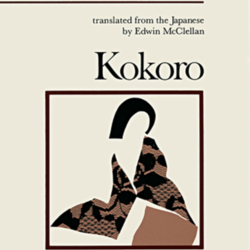


The young man goes home in the second section and lives with his parents for a while, considering his future and reckoning with the potential death of this father. But as this first section comes to a close, the young man has long conversations with the sensei’s wife, and begins to understand there’s more under the surface than just placid isolation. As they talk about love, and marriage, and death, the young man seems to consider his own future. Through his persistence, they do in fact become friends and he realizes that this older friend experiences a kind of profound loneliness and isolation in the world, despite their friendship and despite the sensei’s marriage. He decides to befriend him, not out of sympathy or pity, but out of a kind of respect and intended emulation. We begin with a young college “senior” glomming onto a master or sensei character, seeing a life well-lived full of pensiveness, thoughtfulness, simplicity in action and complexity in thought. This is a more complex novel than I thought I was dealing with when I found myself halfway through. So I read a few of his novels, and I realize that he’s constantly referencing his predecessors in the same way that I found his name often referenced in later Japanese novels. Over time he develops a close relationship with Sensei and his wife and visits their home often.Natsume Soseki is not an author I know much about but according to brief research he’s often regarded as a transitional author who helped bring the Japanese novel into the 20th century (I feel like almost every literature has a figure like this - Maugham, James, Wharton, etc). The narrator first sees him at the beach and is immediately fascinated by his unusual demeanor. He is a recluse and spends his time at home surrounded by his hatred for the human race. Sensei is an enigmatic person who is intelligent and well read but doesn’t do any work. Kokoro by Natsume Sōseki, born Natsume Kin’nosuke is a story that follows a young university student and his strange friendship with a much older man whom he calls ‘Sensei’ which is a common Japanese term to address elders, especially teachers. But it is one of those stories that slowly but surely grows on you and once it does, you cannot let go of its tenacity. I read Kokoro by Natsume Sōseki three months ago and at first I did not find the universal appeal. But today we are talking about another Japanese author, equally if not more well-known (all over Japan at least) than Haruki Murakami. Because I have a lot to say about Murakami and especially Norwegian Wood. I loved it too much but I will save my review of that for another post. I have been into Japanese authors lately and my sudden spiked interest started last year when I read Norwegian Wood by Haruki Murakami on a recommendation by a friend.


 0 kommentar(er)
0 kommentar(er)
